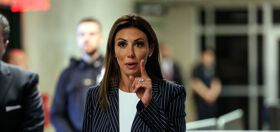
“I don’t think I’ve ever been called a ‘lying motherf*cker’ before.”
Those were the first words Pete Buttigieg said to Michael Harriot at The Root after he published an op-ed titled “Pete Buttigieg Is a Lying MF” earlier this week.
The op-ed, published Monday, criticized remarks the 2020 hopeful made back in 2011 when he was first running for mayor of South Bend, Indiana.
Said Buttigieg: “Kids need to see evidence that education is going to work for them. You’re motivated because you believe that at the end of your education, there is a reward; there’s a stable life; there’s a job. And there are a lot of kids—especially [in] the lower-income, minority neighborhoods, who literally just haven’t seen it work. There isn’t someone who they know personally who testifies to the value of education.”
How about we take this to the next level?
Our newsletter is like a refreshing cocktail (or mocktail) of LGBTQ+ entertainment and pop culture, served up with a side of eye-candy.
In the op-ed, Harriot accused Buttigieg of placing the onus on Black people to work harder rather than white people to recognize the longstanding inequalities that exist to keep non-white communities down.
Wrote Harriot: “This is not just a lie of omission, it is a dangerous precedent. This is why institutional inequality persists. Not because of white hoods and racial slurs. It is because this insidious double-talk erases the problem by camouflaging it. Because it is painted as a problem of black lethargy and not white apathy.”
Evidently, Buttigieg, who has been struggling to connect with Black voters, read the op-ed and decided to call Harriot to talk it out.
In a follow-up piece titled “Pete Buttigieg Called Me. Here’s What Happened,” Harriot details their conversation. He writes that they spoke for roughly 20 minutes and were able to find some common ground.
“I conceded that the problems with institutional racism are so complex and go back so far that I’m not sure that anyone—a mayor, a governor or even a president—could fix them,” Harriot writes. “Buttigieg, however, insisted that there are some things that people in power could do to make things more equal, a point I actually agreed with.”
Harriot concludes by saying that Buttigieg is “not the perfect candidate nor will there be one.” He also expresses lingering doubts over Buttigieg’s commitment to fixing systemic racism.
“There is no way that I can know if he is genuinely interested in engaging black voters, attacking discrimination or crossing the racial divide,” he writes. “There are an infinite number of candidates who have waded into black barbershops or sashayed into black pulpits to assure us that they were on our side when they were only interested in our vote.”
But, he notes, this doesn’t mean the Democratic Party is divided or that Buttigieg’s remarks from nine years ago automatically disqualify him from being the party’s nominee.
“The entire point of the primary process is for voters to dictate their concerns to the candidates and for candidates to learn from voters,” he writes. “Black America wants their party to emerge victorious but not if we have to offer our votes as a living sacrifice for the sake of ‘party unity.'”
“And, as I told the mayor, the article wasn’t meant to inspire outrage. Its purpose was to make a necessary point about black voters and real issues.”
“The only thing I actually know about Pete Buttigieg is that he is a white man. But Pete Buttigieg listened, which is all you can ask a white man to do. Unless, of course, he wants to fight.”




















Crystix
I’m confused by the quote from Buttigieg back in 2011. My take away from it is that the school system is at fault, not the POC students. School systems largely controlled by the white majority that has allowed students to slip through the cracks by not providing the same incentives to minority students as they do to prominent white kids.
Maybe this was just a poorly selected quote by Queerty, but it appears Buttigieg was trying to address the problem faced by minorities – not placing blame. We need better schools. We need better representation. We need to make sure our minority brethren and sisters get all the same chances and rewards their white counterparts get.
It makes me happy to see Buttigieg is willing to call and have a difficult conversation rather than blindly insisting “I’m not racist b/c of a, b, and c…”.
maleficent
indeed . very well said
JanDivine
I agree with most of what you said but I don’t think the problems will be solved by the school systems. It has to start at home long before the schools get involved. And that takes many generations to change. People have to live and die before some things change
Dymension
In dissecting the sentence what he was saying is the kids in these lower income minority neighborhoods lack is hope. They have not seen that the system works (evidence). In not seeing “someone who they know personally who testifies to the value of education,” I did not take it to mean that the adults were failing, but that they did not reap the rewards of education. In other words institutional racism: no matter how hard you try the odds will be stacked against you.
dhmonarch89
recognizing inequalities isn’t going to change anything- money can only do so much- people have to meet you half way.
Joe Dalmas
Yes, whatever, but to call him a MF?! Really? You call this journalism?
OzJosh
And the article “wasn’t meant to inspire outrage”. Puh-lease. One of the reasons political positions get so entrenched is journalists like this one have such a simple-minded approach to their craft. It’s easier to push buttons, paint in black-and-white, and treat anyone in power as the enemy than it is to engage and produce some nuanced analysis. And the reporters’ grudging acknowledgement that Buttigieg might not be all bad is just pathetic.
ElPillo
Harriot sounds angry and not to open to work with people unless it’s his way
ericcutspaper
Okay, first, white gay man(‘gasp!’, a Boomer as well!!!!) opining here. Seems necessary to qualify for entry into this discussion. It is exactly the ‘lying, m****•-f*****’ terminology that is what conservatives, hate-baters, the GOP, etc… want to transpire. Thank goodness Mr. Buttigieg didn’t take the bait, yet instead reached out for better understanding. That’s what a true leader does instead of ‘fometing the animosity amongst citizens.’ While the black electorate, by no means a monolithic entity, has a litany of history to lambast their white counterparts, citizens, in this country, is it then fair to take another generalization; the rampant homophobia amongst those in the black community? Seems, allies need to practice more compassion and acceptance of each other, make stern conversation that is constructive instead of an immediate ‘tear-down’. Yes, we ‘get it’, the implicit-bias, and incessant explicit biases as well, are a maddening set of aspects lingering from a torrent or white-privilege culture. Let’s step back and really address the sector of our citizenry who’ve held the longest set of experiences fighting against privilege culture; the women amongst us! Read up on Susan B. Anthony’s (just celebrating 100 years of women’s suffrage by the way) struggle to see women’s rights addressed and subjugated to the ‘higher priority’ of black ‘men’s’ (not women’s) freedom and vote. Conservative citizens love it when the Moderate/Progressive/Left allies tear at each other; begets their wishlist, like ushering in one of their’s, like Trump.
lord.krath
Article “not meant to inspire outrage” yet the title of the op-Ed was “…lyng MF.”
Okay, how about, “Pete B is being dishonest/ disingenuous…”
Try less provocative speech while calling attention to disagreements or points of view.
They even confessed that they knew nothing of the man except that he was white.
KZNBama
Harriot’s headline and story show a rationale and civility that mirrors Trump. Buttigieg is more reasoned and diplomatic, like Obama. If you disagree, then argue the facts. When you’re reactionary and unreasonable and uncivil, then it ain’t about the problem. It’s all about you and your anger issues.
PLAYS WELL WITH OTHERS
Mayor Pete showed he is willing to reach out to someone who disagrees rather than go into full ballistic attack mode. Something the orange puppet would never do. Doubt he will get the nod this time around…..
But a VP slot or a cabinet position in the God I pray and hope for Democrat administration could set him up for 2024. .
maleficent
Crawl back into your hole! I agree with the comments folks have written about you.
Carlos Primero
FYI: There is a Warren/Buttigieg on the same ticket t-shirt available on Amazon. Interesting idea.
enlightenone
Well said!
PLAYS WELL WITH OTHERS
maleficent: You mean all YOUR multiple screen names? What you got like five currently in use now?
Go away you filthy abhorrent noxious troll puke. Once upon a time this was an excellent site where users posted in a civil manner. You and your vile ilk have infected this site. Take your pathetic filthy arse elsewhere. And possibly try and get a life instead of spewing ignorant nonsensical garbage at people who did nothing to you….
Dack52
Harriot’s hit piece is one of a series of attacks designed to portray Pete B as indifferent to the struggles of African Americans–and it’s working. Not only are these attacks torpedoing Buttigieg’s candidacy this time around– and ensuring his support among Af-American voters hovers near zero–they may well unravel his political future. Conceivably some hidden money, whether from Republican or Biden, is behind this ploy. Instead of angling his piece along the lines of “here is what Pete Buttigieg could have also said in 2011,” or interviewing him today eight years later, it brands him as a lying MF. I’m also disappointed that Deval Patrick and Corey Booker have not spoken in defense of Buttigieg (would not expect that of Senator Harris)…Meanwhile, we have Betsey DeVos and her posse of Christian fundamentalists leading the Education Department and eroding funding for public education. Harriot’s wrath is misplaced.
justyouandi
Dack52, I will respond only to your reference to the “eroding of funding for the Education Dept.” As a public school teacher who paid the tuition for my nieces and nephew to go to private school I hope the federal department of education will indeed cease to exist. Jimmy Carter created it in 1976, before which education was solely operated by each of the states. Public schools have gotten only worse every year. Central planning simply doesn’t work for a lot of services, and education is one of them.
DuMaurier
Okay, put down the smelling salts over Harriot’s headline word choices; this IS the clickbait era, O fragile ones. Second, I don’t if it’s my age or where and how i was raised, but when did it become okay for white people to tell black people about their lives and what would fix things for them? Right-wingers have always done that, obviously; I’m talking about liberal/progressives. As a white guy who was a kid when MLK Jr was killed, all I can say is that it was imparted to me that when it comes to the issues of black people, I haven’t lived that life, I am wholly ignorant of it; it’s not for me to tell black people what needs to be done or even really to have an opinion that hasn’t been ‘cleared’ by the people who KNOW.
I am “of” the people who caused the problems; at most I get to the listen to the people “my” people did this to, and when they decide what needs to be done, help out however they want me to, in a very, very junior position. I thought all white liberals felt that way. Am I wrong or did it change somewhere along the way?
tameron1
I am not familiar with Michael Harriot or his work but as a journalist, and I am assuming that he puts himself in that category, but he needs to temper his outrageously bad choice of words. When you do not know a person’s heart and you choose to judge them over something said 8 years earlier or more recently and take their words even slightly out of context, plus proceed to call them a name that no one deserves, well, you need to go back to school and learn to edit and perhaps add a course in ethics. To reduce someone like Mayor Pete who is obviously sincere and thoughtful to the lowest possible common denominator is cheap. Mayor Pete may be struggling with the African American Community but he will either find his way with them or he will fail. Mayor Pete is many things but a “lying MF” he is not. Cheap, dishonest journalism is everywhere in America and it looks like here we have another example.
sananto35
What an interesting moment! Pete has drawn fire like no other candidate on issues around race, and understandably so — if he can harness this attention, focus it in a constructive way on public dialogue with POC, he might be the only and best candidate to advance the work of social justice. Systemic racism is a white problem, so a white guy needs to address it. If Pete is good (and smart), he will. That will serve his campaign well, and all of us.
enlightenone
Could be inspiring if FULLY embraced!
Boston495
Systematic racism is a huge problem. People get judged all the time. But I think was Mayor Pete was saying is that black peoples need to work hard and white people need to work hard. Nobody should get things free, just because of the color of their skin. And none of us should have to pay for the @sins of our fathers. True equality means all people should be treated equally. Not discriminating about someone just because they used to discriminate against you. Two wrongs don’t make a right.
jkb
He claimed 400 prominent African Americans endorsed his Douglas Plan. 200 were white and the three most prominent African Americans stated they never endorsed the plan. He is a lying MF. Full stop.
enlightenone
Listening, however difficult, is half way. Using elected power and “white male” privilege can effect CHANGE I can believe in!
boymikefl
I live in Baltimore City. Blacks (poor) come into white (money) neighborhoods & rob us. We’re sick of it. They WILL NEVER take responsibility & blame others. In my neighborhood, if we have a bad neighbor, it doesn’t last. Work on your neighborhoods. Stop blaming teachers when your kid attacks them (physically). Stop blaming whites! Does Oprah, Tyler Perry, Steve Harvey? OBAMA??? Work on yourself! Be responsible. Get a job, then you won’t rob & go to jail. GET A BRAIN! Clean up the trash in your neighborhood or better yet, DON’T LITTER!
curiobi
So black people are poor criminals and white people are rich victims of black crime. Racist peice of trash. Criminals are white and poor as well, criminals are also white and rich and stealing everyone’s pension. Stop trying to pretend crime belongs only to people who are poor and/or black. This is a blatant lie and you are a racist so take it to back to your Nazi friends.
batesmotel
Well this is an arrogant entitled country with no manners, so what else do you expect from dirt.
JAWIWA
Oh, the feels that gay wypipo catch when Black people have the temerity to speak our truth about their Great Gay White Hope. There is a reason that Mayor Pete has almost no support from Black people, including Black LGBTQ+ people: his record as mayor as it relates to the Black people in his city. And all of his (many) public gaffes about race bear his general cluelessness about Black people out. So, while he may yet do well in super-White states like IA and NH, that is probably the end of it.
Tombear
The husband and I are still voting for Pete!
My2CentsWorth
The need to work harder is true. If discriminated only works to be equal he, or she, will lose out more times than not. It should not be that way but that is U. S. reality (not unique to the U. S.).
djmcgamester
I’m not going to argue that people should feel decent employment is attainable after spending the time getting a degree. After all, why graduate high school if you’re just going to be a cashier or a waiter? Neither especially needs a high school diploma. College is another story. There should be no degree available that leads nowhere.
TxCudlr
Since Michael Harriott started out jumping ALL OVER & JUDGING Mayor Pete, slandering him, & calling him a MF liar, sounds VERY reminescent of d. trump. This Harriott sounds like a REAL piece of a low life. Mayor Pete was a city leader. What has Harriott led, other than a floating balloon??? Mayor Pete knows this info either by experience or he did research. “My” guess is Harriott didn’t have a clue to any of this, but yet still decides to call Mayor Pete a MF liar. did Harriott even do any research about this, before he slandered Pete??? AND, here’s the killer of ALL this: Mayor Pete was MAN ENOUGH to call Harriott to discuss the issue, what was said, & what was meant; NOT to bad talk or to argue w/ Harriott!!!!!!!!!!!!!!!! NOW, the question is, why did Harriott who’s NOT man enough take a comment that was said by Pete YEARS ago, twist it around to suit himself, & end up calling PETE a MF liar……INSTEAD OF CALLING MAYOR PETE, DIRECTLY, HIMSELF, & ASKING HIM FOR AN INTERVIEW “THEN”, TO ASK HIM QUESTIONS & WHAT HE MEANT BY HIS STATEMENT???????????? THAT is NOT SMART reporting, just easier to slander someone!!!!!!!!!
djbear
In teaching the Economics of Education, I learned that thesingle most important factor in success in school is in the home – reading to a child and seeing that reading is important to the adults. The school can not change that and it is unlikely that the adults will be changed, particularly when they are working two or three jobs to survive. Volunteers (maybe even Churches) could do much in the pre-school years to make up for what parents don’t do but we also know it has to be continually reinforced in the home. I am an optimist – this problem may appear racial but it is really a perpetuation of the poor (and race unfortunately divides some people into the poor category (discrimination).
Keebler ILF
The problem I have with Buttigieg is the way he handled racism in his own police department as Mayor of South Bend, Indiana. Instead of dealing with the racism inside the department, he chose to PUNISH THE WHISTLE BLOWER who reported the racism. Sound familiar? Back in June 2019, he said he was going to take a look at the problem. He should have tackled the problem when it was first reported, not now when he wants something from the voters.
Recently, Michael Bloomberg apologized for the ‘stop and frisk’ policy he implemented in NYC when he was Mayor. He should have ended the policy when people were complaining about it back then, calling it racial profiling. He didn’t. I don’t believe he is sincere when he apologizes now when he is running for President. He pretends to care when he wants something from the voters.
Prax07
Other than Obama I personally can’t think of one successful black person outside of the entertainment industry, and with few exceptions they’re famous for being gangster rappers or daytime trash tv hosts. Maybe look inside your own community that’s holding you back instead of blaming whitey for keeping you down. Stop acting like you’re owed success.
dinard38
Well, if you can’t think of any successful black person outside of entertainment, then you need to do a little more digging. Just because you don’t personally know of any doesn’t mean they don’t exist. And if you think about it, perhaps you don’t personally know of successful black people because they are NOT celebrities. They are just everyday people succeeding in life.
I’m not usually offended by people saying stupid, ignorant sh*t online, but as a black man, I’ll tell you that your comment is offensive and racist and so damn ignorant!! We black people don’t walk around thinking that we’re owed success simply because of our history in this country. But at the same time, you are a fool to think that racism doesn’t exist, and that minorities in this country have the same opportunities for success as white people do. We don’t. We have to work ten times as hard to obtain the same level of success as a white person. And given the current president and his cult followers, their actions are just a reminder that this country still has a long way to go in terms of dealing with racism and equality.
Ronbo
Yes. Obama was elected president. That’s where it ends. Obama served as an identity politician to keep the rich rich and the poor poorer.
Obama did bring us Republican Romneycare which funnels healthcare funds over to insurance companies ensuring their profit at the expense of actual healthcare. Profits = less healthcare.
People are still going bankrupt for their medical costs.
Over 14,000,000 have no insurance and most of the rest can’t afford to use their insurance.
The minimum wage went from $7.25 to $7.25 under Obama’s 8 years.
Did I forget the Lilly Ledbetter Fair Pay Act. Today women get paid as much as men. Right?
The rich got richer while the poor got poorer – and a lot more poor people were created.
Like Obama, Buttigieg, is another identity politician (only this time gay), elevated by the rich to keep them rich.
rray63
There’s some good info in here and some crap. Bottom line we already spend more money than any other country, so is spending even more the answer?
jasentylar
Mayor Pete told the truth. He never placed blame on any community. This is simply an attack to get more divisiveness started whereas Pete is only interested in solutions.
StokeMasterJack
It might be worth noting that the most liked comment on the Root post was an anti-gay slur.
mgconlan
I first saw this story on MS-NBC, which actually showed Pete Buttigieg’s videotaped comment from 2011 and then Michael Harriot’s hysterical overreaction. It seems that what Buttiegieg had to say — “Kids need to see evidence that education is going to work for them. You’re motivated because you believe that at the end of your education, there is a reward; there’s a stable life; there’s a job. And there are a lot of kids — especially [in] the lower-income, minority neighborhoods, who literally just haven’t seen it work. There isn’t someone who they know personally who testifies to the value of education” — was basic common sense. Yes, racism is one of the big reasons Black people (and other people of color) don’t have that many role models as they should for the value of education. But that doesn’t mean that you can blame white people for ALL the problems faced by Black people, which was what Harriot’s obscene (in both senses) response amounted to. Harriot, in his comments on his phone call with Buttigieg as well as the nasty and (I think) unfair op-ed that inspired it, keeps referencing that he is Black and Buttigieg is white. It sounds to me like Harriot is the racist here — and it also sounds to me like Harriot doesn’t think any white person can ever do enough to prove they’re not a racist. It’s the kind of attitude that drives white voters into the arms of the Republicans, who tell them it’s O.K. to be racist and Blacks are just ungrateful crybabies who want things they don’t deserve. Harriot, not Buttigieg, is the racist here!